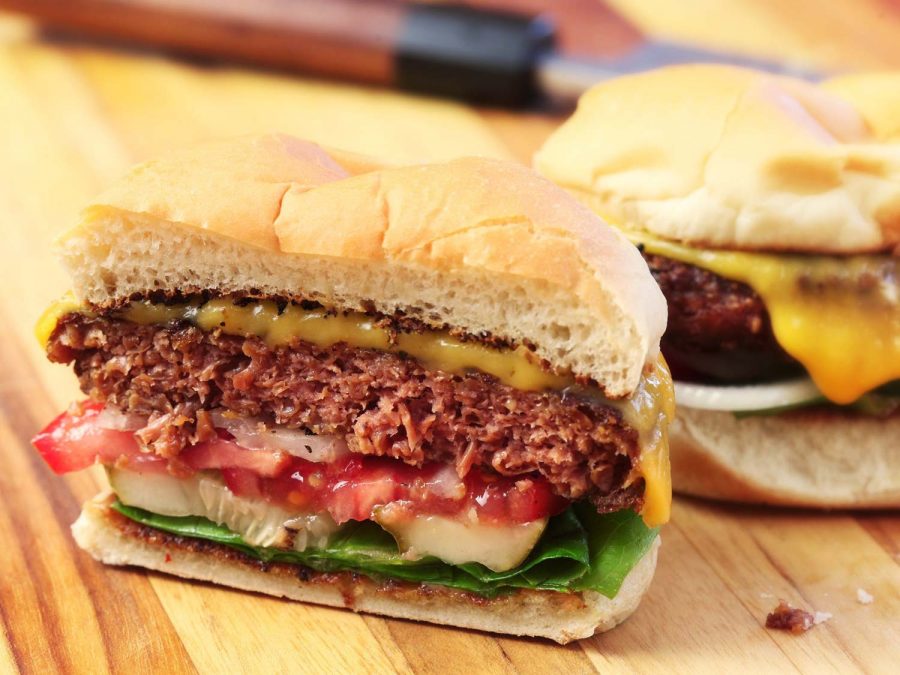Vegan Meat Production Goes “Beyond” the “Impossible” to Bring Vegetarian Burgers to Consumers
“Impossible” and “Beyond” burger give vegetarians a taste of “meat.”
September 20, 2020
Freshman Kennedy Oviatt took one bite of her Beyond Famous Star burger at Carl’s Jr. and thought it tasted good. She says she would have thought it was real meat if she didn’t already know it was a vegan burger. Kennedy likes the idea of eating less meat, so the vegan burger was a hit with her.
The “Beyond Famous Star” is just one of the vegetarian options at Carl’s Jr. Other fast food restaurants are also jumping into the vegan burger business. Burger King and others are offering similar menu items to appeal to those who want a vegetarian burger.
How Did it All Begin
A new craze has grown throughout the years, Veganism! So scientists and engineers have been trying for years to perfect plant-based “meats”. In 2009, a company called Beyond Meat surfaced with a burger patty entirely made of pea protein and beets for color. This company changed the meat industry to a positive, more inclusive way.
In 2011, another company emerged, Impossible Meat Company. This company made the same product (plant-based burger patties), but with soy beans and potato proteins.
These plant-based patties from both companies were added to the menu of restaurants like Burger King, Carl’s Junior, Red Robin, and many other places. Consumers can also get them in grocery stores like Harmons and Smiths. This is something that changes the meat and burger industry with not only competing with beef and burgers, but now competes with a new plant-based product that is better for the environment and the people consuming them.
How is Vegetarian Meat Made?
With the power of science, these businesses are now able to 3-D print plant based meat! An Israeli company, Redefine Meats, developed a print that could create plant-based steaks. The CEO of the company, Eshchar Ben-Shitrit, said in an interview with Fast Company, “We believe in the next 20 years we’ll see a massive shift towards replacing animals in the food supply chain,” This new technology can change the whole process of creating and manufacturing plant-based meats.
Normally, these patties, still being made with science and technology, have a different process of being produced. Beyond Meat uses pea protein, mung bean, faba beans, and brown rice for having on par protein level as beef. For fats, they use cocoa butter, coconut oil, and canola oil making the patties juicy and be able to sizzle and sear while cooking.
Why Eat Plant-based Meats?
Meat, expectantly beef, has high risks of rapid weight gain, stroke, diabetes, and heart disease. Meat also produces a lot of greenhouse gas, which is really bad for the environment. Plant-based meat makes way less greenhouse gases and uses thousands of gallons less of water then producing beef does.
Plant-based VS. Beef
Plant-based burgers and beef burgers are only similar in one major thing, the calorie count. Sadly, plant-based meats have many fewer calories than regular beef: plant-based having 240 calories and beef having 300 calories. However, plant-based patties contain less cholesterol, more good/healthy fats, and it contains fiber which beef does not have! The taste, smell, texture, and overall presentation of the plant-based burgers are almost, if not identical to a purely meat burger. The biggest downside right now is the cost. Vegan meat costs more at restaurants and grocery stores.
Fun Facts
There are a lot of really interesting things about plant-based patties.
- They were invented for meat eaters by meat eaters, because of the negative effects of beef production.
- They bleed like meat, due to beet juice and some oils plant- based meats to bleed like a pure meat burger or steak.
- Some people can’t even tell the difference, in an article by Cnet in the Health and Wellness section, the author states, “As a vegan, the texture and taste freaked me out so much that I couldn’t bring myself to eat it,” then later states, “If restaurants just switched to plant-based options half of the people wouldn’t even know unless specifically told.
- As mentioned before, places like Israel and Russia are going to start 3-D printing plant-based meats like steak and possibly chicken and burgers. This makes it easier to mass produce these plant-based meats for consumer.










